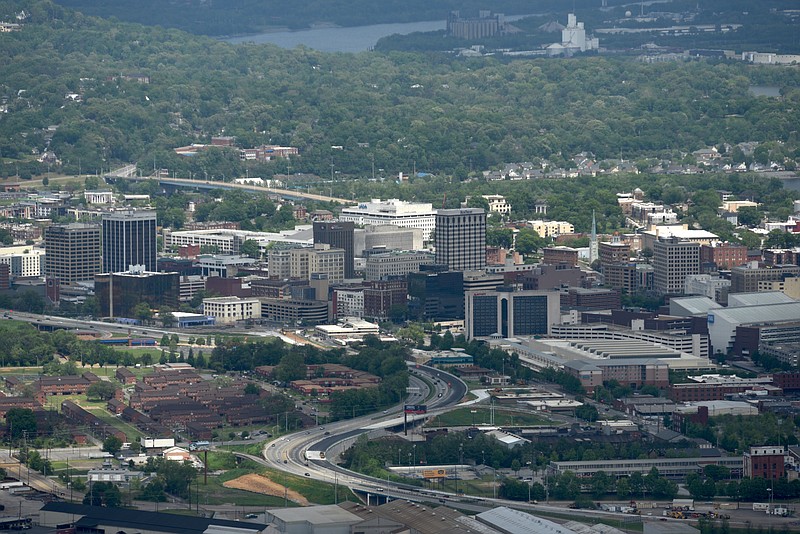Too many Chattanoogans don't have a voice in local efforts related to development, education, affordable housing and economic mobility, said nearly two dozen community-based leaders at a discussion on the city's future at the University of Tennessee at Chattanooga on Tuesday.
Chattanooga is nationally known for the community-based visioning process that took place in the 1980s and 90s. Signposts on the Tennessee Riverwalk harken back to a time when "all segments of the community came together." But today the city can't boast of robust community engagement and bottom-up planning, according to those attending the McKee Learning Lunch, which was co-sponsored by UTC and the Chattanooga Times Free Press and moderated by Dr. James Tucker, UTC's McKee chair of excellence in learning.
"There isn't a place in Chattanooga where I have seen all segments come together on any particular effort, ever," said Lakweshia Ewing, a local entrepreneur and education activist. "The overarching thing is that Chattanooga is not being an equitable place to live."
Those working behind the scenes in both private and public realms to shape the city's future point to meetings, focus groups and charrettes and say that their plans were built with community feedback, but too often those meetings feel meaningless to participants, said many in the group, which included representatives from the city, the chamber of commerce, Co.Lab and a host of nonprofits and neighborhood groups.
"There is a difference between input and power," said Michael Gilliland, board chair of the grassroots nonprofit group Chattanooga Organized for Action. Those making decisions "put input on the shelf, and don't go back to it because decisions get made a particular way. How many working-class people are on a board in Chattanooga?"
Chattanooga Mayor Andy Berke didn't want to comment for this story, but in the past Berke has said that he highly values and seeks public feedback and takes care to develop all plans with community input. In the state of the city speech that Berke delivered last week, he acknowledged that Chattanooga needs to work on becoming a city that provides opportunities for all and not some.
"The Berke administration is enormously proud of Chattanooga's positive economic trajectory over the last several years, and we're committed to doing what we can to continue this remarkable growth. However ... Chattanooga's economic growth also means that the costs of living are growing as well," said Kerry Hayes, a spokesperson for the mayor's office. "Those who have been left out of the city's growing prosperity risk falling farther behind, as more and more of their income is absorbed by rent and transportation expenses. Left unaddressed, even with Chattanooga's rising wages, more people will find it increasingly difficult to remain in the neighborhood of their choosing and build wealth."
Hayes said the Berke administration is looking forward to partnering with local nonprofit agencies, private developers and members of the community to determine how Berke's $1 million commitment to affordable housing, which he announced last week, can be used to protect affordability for the largest number of Chattanoogans.
Those charting Chattanooga's course need to listen to residents and value diversity, but they also need to be careful about who they tap when trying to be intentional about getting black and Hispanic voices at the table, some lunch attendees said.
Blacks and Hispanics in Chattanooga are disproportionately affected by poverty, yet those tapped to sit on local boards often can't speak to the traumatic experience of poverty and the anger felt by communities who have felt left out of the renaissance, said Dr. Everlena Holmes, a community organizer who has been helping build neighborhood coalitions in East Chattanooga.
People in East Chattanooga are scared, she said. They believe gentrification will displace them, but they don't know what to do about it.
"There are too many diverse boards that aren't representing the people they represent," said Holmes. "Chattanooga is changing to meet the needs of people coming into Chattanooga, not the people living in these inner-city neighborhoods."
Others said that many remain silent because they have lost faith in the institutions that serve the community.
"Powerlessness leads to a cynicism," said Eleanor Cooper, former head of Chattanooga Venture, the now defunct community-based nonprofit which jump-started Chattanooga's downtown revival. "But people who are empowered and engaged leave their cynicism behind."
For a time, Chattanooga Venture provided avenues for citizen participation, as well as community organizing and planning, but those avenues no longer exist, said Maria Noel, the director of diversity and inclusion for the Chattanooga Area Chamber of Commerce who was also an employee of Chattanooga Venture before it lost its funding for the Lyndhurst Foundation in the 1990s.
In the meantime, the old, industrial power structure that Chattanooga Venture had hoped to topple snapped back into place, said Strat Parrott, a local entrepreneur and creative strategist at Juncture.
"The city is not making any headway because there is no impartial, third party pushing it along, representing the community as a whole," he said.
Still, James McKissic, director of the city's Office of Multicultural Affairs, said citizens still hold a lot of power.
One complaint can be ignored. So can two, he said. But a group of concerned, vocal citizens can still change the course of the city.
Many might assume that the mayor's $1 million commitment to affordable housing is a predetermined plan, but McKissic said community voices can shape how it turns out.
"Now is the time to make known what areas need investment," he said. "Now is the time to say $1 million is not enough."
Contact staff writer Joan Garrett McClane at jmcclane@timesfreepress.com or 423-757-6601.

